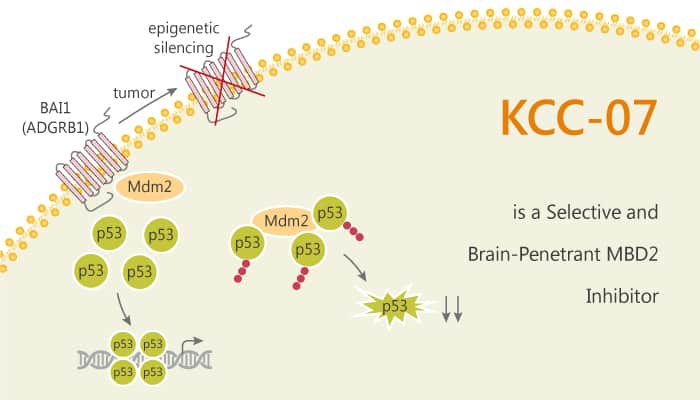Medulloblastoma (MB) is the most common and aggressive malignant brain tumor in children. MB has four clinically and molecularly distinct subgroups, and they are the wingless (WNT) group, the sonic hedgehog (SHH) group, group 3, and group 4. In human MBs, TP53 mutations are frequent in the WNT and SHH groups. G protein-coupled receptors (GPCRs) are the largest family of transmembrane proteins in vertebrates, are the molecular targets for about 50-60% of therapeutic drugs worldwide. A recent study suggests that GPCR expression patterns can also delineate MB subtypes. The BAI proteins (BAI1-3) belong to the adhesion-subgroup of GPCR. The brain predominantly expresses them. In addition, recent genetic studies show the genes encoding BAI family proteins (ADGRB1-3) are silenced and/or undergo somatic mutations in several cancers, including melanoma, lung, breast, ovarian, and brain cancers. In this study, KCC-07 is a potent MBD2 (methyl-CpG-binding domain protein 2) inhibitor.

KCC-07 is a potent, selective, and brain-penetrant MBD2 (methyl-CpG-binding domain protein 2) inhibitor with anticancer activity.
KCC-07 prevents binding of MBD2 to methylated DNA and activates BAI1 inducing anti-proliferative BAI1/p53/p21 signaling. Moreover, it clearly inhibits MB cell growth in vitro, consistent with the induction of anti-proliferative BAI1/p53/p21 signaling. KCC-07 largely abrogates MBD2 binding to the ADGRB1 promoter and restores BAI1 mRNA and protein expression in BAI1-silent MB cells. Furthermore, it inhibits tumor growth and significantly extends the survival of MB xenografts in vivo. It inhibits MB growth by reactivating the BAI1-p53 tumor suppressor axis and, thereby, represents a promising chemical scaffold for further drug development. In addition, KCC-07 shows excellent brain distribution.
In summary, KCC-07, an inhibitor of MBD2 binding to methylated DNA, could reactivate ADGRB1 expression. KCC-07 is bio-available, depleted MBD2 from the ADGRB1 promoter, and then leading to induction of BAI1 and p53 expression, and reducing human MB growth in culture and in MB mouse models in a p53 and BAI1-dependent way.
Reference:
Dan Zhu, et al. Cancer Cell. 2018 Jun 11;33(6):1004-1016.e5.